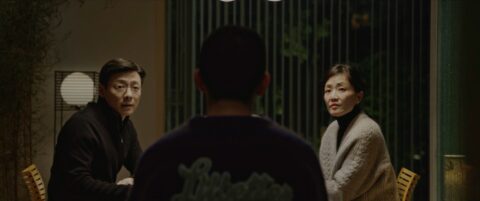Chet Hanks. Donald Trump Jr. Napoleon II. No one wants a failson. But in a country where up until very recently, you’re only allowed one, the pain of raising a loser is much higher.
The Tu parents would very much like their son, the dim-witted, yet sensitive Wei (Lin Muran) not to be a failson. In many ways, he’s not. For one thing, he’s a damn fine fencer, encouraged by his teacher to try out for the city. But he’s not doing what his parents want him to do: study hard, go to college, and become a traditional success. If only they could’ve had another…
A Chinese one-child policy critique wrapped up in a Hitchockian thriller, Brief History of a Family (Jianjie Lin, 2024) probes the very bonds of family through an ice-cold aesthetic and effective stripped-back performances. Showing how a strange child slowly manipulates himself into a rich family, usurping Wei without ever making his true intentions clear, its careful manipulation of tone and genre makes for a thought-provoking and fun experience.
“There’s no shame in wanting to improve yourself,” says Wei’s father (Feng Zu), a stern and career-driven man, working as a successful biologist. In the centrally-organised yet highly capitalist society of modern China, there is no room for slacking. We open with the 15-year-old Yan Shuo (Xilun Sun) working out on the pull-up bars, the camera staying static as he forces his frail body to do more and more. Then in the first of harsh yet grimly comical moments, a basketball thrown by a bully hits him in the back of the head.
Thankfully, the kind-seeming Wei recommends that he see the school nurse. The two boys strike up a friendship. Wei even invites him to his lavish apartment, replete with an aquarium, fine china, beautiful bedsheets and wall designs, and lighting fixtures that resemble clouds. But Wei doesn’t quite realise that he’s way over his head, with Shou having designs on the entire Tu family. Finding a way to reflect both Wei’s pushy father and kind mother’s (Ke-Yu Guo) desires better than the son ever could, Shou — apparently coming from a broken home — wants not only to get their approval, but to become the second son they desperately wish they had. It’s almost as if the aspiring middle classes have more drive than their lazy upper-class counterparts.
This tale of a psycho manipulating a rich family sure sounds familiar… Yes. Comparisons to that abomination even your cousin saw, Saltburn (Emerald Fennell, 2023), are inevitable. There’s even a similarly grotesque bathtub scene! But while Saltburn was a strange, often frustrating collection of beautiful yet empty images in service of a banal class critique, Brief History of a Family’s rigid formal qualities deeply enhance the unnerving storyline.
There are the gorgeous iris shots, cutting from microscopic images of cells to surveillance-like observation. There’s the expressive use of widescreen, fully exploiting the frame to create tension and mystique. And there are other bold stylistic choices — such as the unsettling breaking of the 90-degree rule, or a novel way to represent a video call — to create a sense of unease during nearly every scene. One moment in particular — a perspective bait-and-switch involving a birthday cake —was utterly savage; both hilarious and mean at the same time.
And Xilun Sun’s performance far outweighs Keoghan’s in its tiny, cutting details, finding the perfect words to say to Wei’s parents at the perfect time while remaining scarily silent when it actually matters. These silent stretches — simply watching, observing, perhaps calculating his next move — are the best. By never letting us into Yan Shou’s mind, he grows in menace. For some reason, he kinda reminded me of the nightmare-inducing Penguin from The Wrong Trousers (Nick Park, 1993).
Not everything works. A few wonky dream sequences threaten to undo the tightly wound tension, putting a mystical spin on things when pure realist tension would’ve sufficed. And the use of classical music, such as Bach’s “Well-Tempered Clavier,” worked well the first few times, but was quickly over-used, giving the film unnecessary grandiosity when cutting subtlety was in order.
But look: this is Lin’s first feature. These things can be ironed out in subsequent work. What stands out is a dark and often rather amusing first feature; not only a portrait of an insidious little shit who I couldn’t stand yet couldn’t look away from, but a politically-charged and deeply satisfying work. Maybe failsons, at least in providing great topics for art, still have their uses.
Redmond is the editor-in-chief of Journey Into Cinema.
